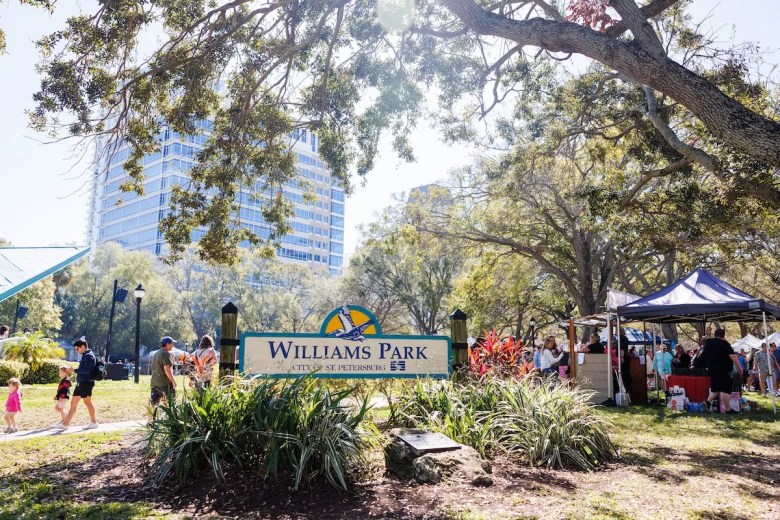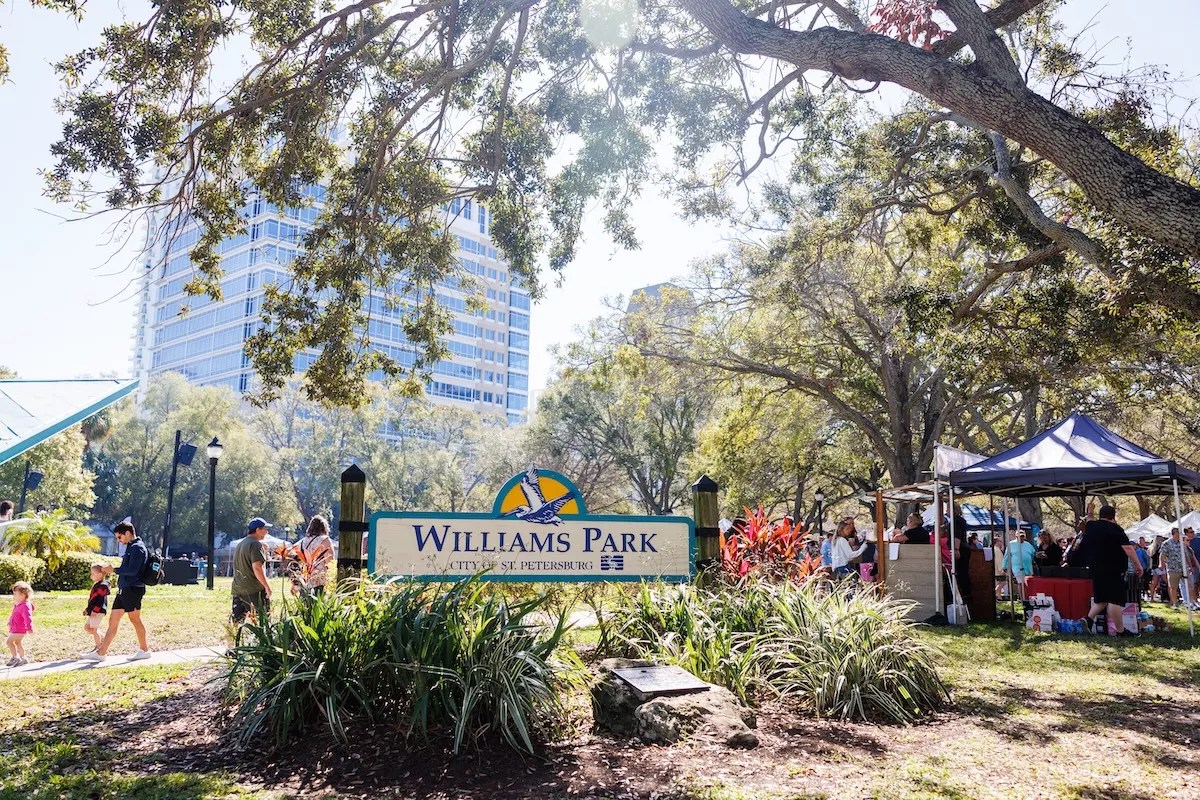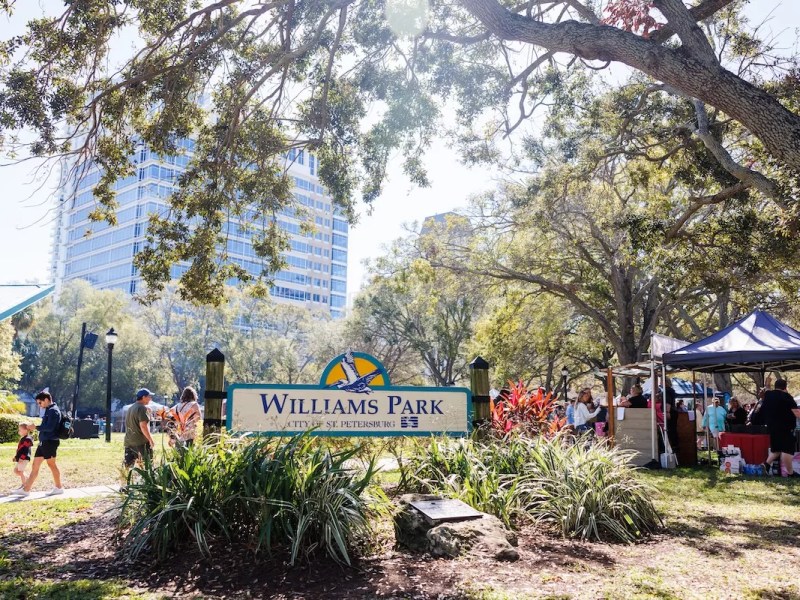 Williams Park in St. Petersburg, Florida. Credit: Photo via cityofstpete/Flickr Late last month, St. Petersburg restaurant owner Ronicca Whaley sued the city of St. Petersburg, saying that the city has caused damage to the Shiso Crispy restaurant by failing to enforce laws banning camping in public places. Last Thursday, according to documents obtained by Creative Loafing Tampa Bay, local mutual aid group Progressive People’s Action enlisted the help of the Southern Poverty Law Center (SPLC)—a civil rights organization that defends the legal rights of marginalized people—to represent the interests of St. Pete’s homeless residents who stand to be impacted by the outcome of the case.
Williams Park in St. Petersburg, Florida. Credit: Photo via cityofstpete/Flickr Late last month, St. Petersburg restaurant owner Ronicca Whaley sued the city of St. Petersburg, saying that the city has caused damage to the Shiso Crispy restaurant by failing to enforce laws banning camping in public places. Last Thursday, according to documents obtained by Creative Loafing Tampa Bay, local mutual aid group Progressive People’s Action enlisted the help of the Southern Poverty Law Center (SPLC)—a civil rights organization that defends the legal rights of marginalized people—to represent the interests of St. Pete’s homeless residents who stand to be impacted by the outcome of the case.
The lawsuit against the city says that Shiso Crispy’s owner, employees and patrons have been subjected to harassment and threats by people who “regularly sleep overnight” in Williams Park and sidewalks outside the business. On Aug. 19, the city filed a motion to dismiss the case, saying that the police department enforces all applicable laws, and that Whaley’s complaints amount to a “litany of scandalous recitations designed to generate publicity, not plead a case.” The court has not yet ruled on the city’s motion to dismiss.
Florida’s public camping law passed last year despite sharp criticisms and makes sleeping overnight in public places illegal in many circumstances. The law went into effect in January of this year and allows residents to sue local governments if they don’t enforce it. Detractors like the Florida Policy Institute say the law criminalizes homelessness without offering real solutions. The city’s motion to dismiss the case says that the law is designed for tent encampments, citing remarks made by Gov. Ron DeSantis when he signed the law into effect, and also says that the city has taken measures to prevent these for decades.
Related
Councilmember Richie Floyd told the San Pedro Gazette that they are still seeking clarity regarding the ‘Clean and Safe’ program
Earlier this year, the Monroe County Sheriff’s Office cleared out a homeless encampment in Marathon after a lawsuit was filed by county residents and business owners. The land the encampment sat on was owned by the Florida Department of Transportation, who heard about the lawsuit and then asked MCSO to clear out the property. This resulted in the plaintiffs dropping the lawsuit.
SPLC senior staff attorney Jackie Azis told CL that if this legal battle continues, it will mark the first time a court has to rule on a suit filed under this new law, making it even more important for homeless residents to have a voice in the discussion.
Third parties—parties who are neither the plaintiff who filed the suit nor the defendant being sued—may motion to intervene in a case when they have a stake in the outcome. In this case, Azis said Progressive People’s Action has an interest in the case based on their frequent work with St. Petersburg’s homeless population: “PPA has stepped up because, you know, the city has its own interests; obviously, Whaley, as a business owner, has her own interests; but the people who are going to be the most intimately impacted also have interests.”
This wouldn’t be the first time St. Petersburg is involved in a legal battle that sets precedent for laws on homelessness. In State v. Penley (1973), St. Petersburg’s ordinance against public sleeping was found to be unconstitutional. In Catron v. City of St. Petersburg (2011), the city’s policy on trespassing homeless individuals from public property without due process was also found unconstitutional—specifically citing removal of a homeless man from Williams Park, the same park mentioned by Whaley in her lawsuit. Azis said that PPA’s intervention in Whaley’s case will ensure that, should this litigation become precedent-setting, the interest of the homeless individuals affected will be represented, not just that of Whaley or the city.
Azis said that while Whaley may say she wants to improve conditions for homeless people her lawsuit indicates otherwise. Whaley said that one of her motivations for the lawsuit is to help the homeless population in St. Petersburg by forcing the city to create a public space where people are allowed to sleep. Speaking to WTSP, Whaley referenced a part of the anti-camping law that allows counties to create spaces where public sleeping is allowed: “They’re adults that want to do what they want and I get that. So let’s provide, as the law says, a place for them to flourish safely and securely that is better for both sides.” However, Azis said, the law only permits counties to designate these spaces, and the city government can not do so on their own. It is unclear how the lawsuit would prompt the city to develop this location. Proposed outdoor sleeping sites must meet several requirements regarding location and resources on site and require approval from the Florida Department of Children and Families. The same WTSP report said Pinellas County did not yet have any plans to designate such a space.
Whaley’s lawsuit against the city vividly alleges public defecation, misogynistic harassment and property damage carried out by residents who she says are homeless. One reported incident involved an individual emptying a colostomy bag at one of the restaurants. The city’s motion to dismiss the lawsuit says that anecdotes like this are less about the law and more about influencing public opinion: “This type of inflammatory language was not added to the Complaint to prove the elements of F.S. § 125.0231, but rather strictly to get publicity for her lawsuit.”
In a public comment Whaley made at a June 10 St. Petersburg City Council meeting—several weeks before filing her suit—Whaley said: “When I send these people to jail, they show up right back on my property. … I have a gang of homeless people right now that know that I am trying to make a difference on my block and they have all come to my property and told my employees that they declare war.” Whaley’s lawsuit highlights a police incident report, where one of Whaley’s employees told police that a man said to him: “Your owner fucked up bad by kicking homeless people off the street. Your boss has created a war.”
Azis said that the outcome Whaley seeks is “inappropriate and unlawful,” and the city of St. Petersburg said in their motion to dismiss that Whaley “seemingly wants 24-hour around the clock monitoring of her various businesses at great expense to City taxpayers.”
“What the intervenors (PPA) want is an appropriate relief,” Azis said. “One that will not increase enforcement of punitive measures against people experiencing homelessness for simply sleeping, which is something that we all must do to live and survive.”
Whaley responded to a request for comment via a statement emailed to CL by her lawyer. The statement reads:
“Ms. Whaley’s lawsuit isn’t meant to criminalize, punish, or ostracize anyone in the homeless community. She fully recognizes that homelessness is a complex challenge, one that calls for the City of St. Petersburg to step in and support those who need it most. The suit’s true aim is to encourage the city to deliver that essential assistance. At its core, this action simply seeks to enforce the law as it stands today, and Ms. Whaley hopes the city will move quickly to create solutions that serve both the downtown business community and individuals experiencing homelessness.”
However, Whaley did not respond to several specific questions, including ones that address how specifically she believes this lawsuit will benefit homeless people. She also did not confirm whether she had asked county commissioners to designate a space for outdoor sleeping.
The city’s lengthy motion to dismiss the case refutes her claim that she is seeking to “enforce the law as it stands today.”
SPLC and PPA’s motion to intervene in the case says that Whaley’s lawsuit “alleges facts that are irrelevant to homelessness and sleeping, thus making a false and biased connection between homelessness and criminal activity.”
UPDATED 08/30/25 6:06 a.m. Updated to include a statement from Whaley’s lawyer.
Subscribe to Creative Loafing newsletters.
Follow us: Google News | NewsBreak | Reddit | Instagram | Facebook | BlueSky
This article appears in Aug 28 – Sep 3, 2025.
Related


